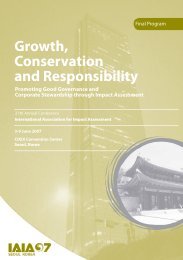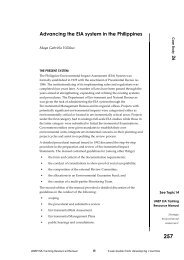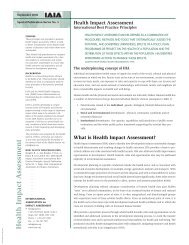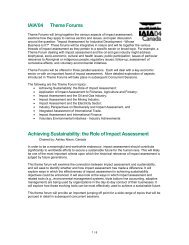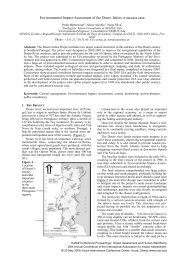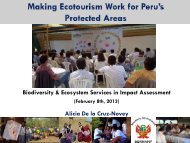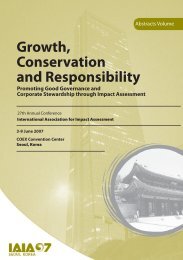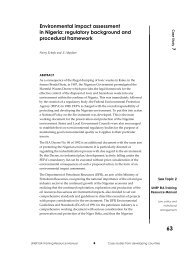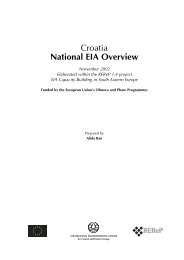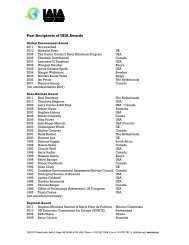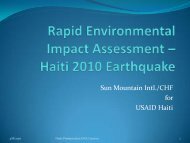Environmental Awareness As A Panacea For Sustainable ...
Environmental Awareness As A Panacea For Sustainable ...
Environmental Awareness As A Panacea For Sustainable ...
Create successful ePaper yourself
Turn your PDF publications into a flip-book with our unique Google optimized e-Paper software.
<strong>Environmental</strong> <strong>Awareness</strong> <strong>As</strong> A <strong>Panacea</strong> <strong>For</strong> <strong>Sustainable</strong><br />
environmental management in Africa<br />
Presenting Author EMMANUEL EKPENYONG -<br />
emmanuel.ekpenyong@shell.com<br />
Introduction:<br />
<strong>Environmental</strong> awareness is knowledge leading to concern for<br />
the conservation and improvement of the environment. <strong>Awareness</strong> of<br />
environmental sustainability issues is considered very low in<br />
sub-Sahara Africa compared to other social phenomenon such as<br />
conflict, corruption and food security. <strong>Sustainable</strong> environmental<br />
management is not possible without participation by the people.<br />
Meaningful participation requires that people be informed about<br />
the environmental effects of their day-to-day activities.<br />
It is paradoxical that the worst environmental challenges<br />
in the world - environmental degradation, disruption of rural<br />
livelihoods and environmental conflict are manifest in several<br />
part of Africa yet, the population and national leadership<br />
across the continent are least informed about environmental<br />
sustainability issues. It was highlighted that African<br />
leaders/negotiators had limited understanding of the issues and<br />
processes involved in the Kyoto protocol and therefore could not<br />
make meaningful contribution to the negotiations (Daily<br />
observer, 2009). If policy leaders are less informed of<br />
environmental issues and its impact on development, it becomes<br />
more glaring that there is a significant gap in the level of<br />
environmental awareness across Africa.<br />
'IAIA09 Conference Proceedings', Impact <strong>As</strong>sessment and Human Well-Being<br />
29th Annual Conference of the International <strong>As</strong>sociation for Impact <strong>As</strong>sessment,<br />
16-22 May 2009, Accra International Conference Center, Accra, Ghana (www.iaia.org)
Factors contributing to low environmental awareness in Africa<br />
Illiteracy and poverty is pervasive in Africa and this<br />
meant that poor families are more concerned about daily survival<br />
than keeping an eye on environmental issues. Poverty in Africa<br />
is partly a product of years of environmental degradation and<br />
un-sustainable agricultural practices such as bush burning.<br />
Globalization and rapid industrialization of the last two<br />
decades in Africa, especially the phenomenal growth of the<br />
extractive industry brought with it attendant environmental<br />
challenges which compromised the welfare of resource-poor farm<br />
families.<br />
Large part of the continent is classified as countries with<br />
low human development (UNDP, 2008), the population is daily<br />
fixated on how to put food on the table rather than bother with<br />
the niceties of environmental sustainability. This low interest<br />
and awareness directly leads to more reckless environmental<br />
problems, which in turn breed poverty in a vicious cycle that is<br />
self-sustaining.<br />
Furthermore, education in the continent is still very low<br />
due to inadequate infrastructure, and manpower as well as under<br />
funding of the education sector. Due to limited number<br />
educational facilities, there is a relative low access to<br />
education, especially for women in the region<br />
A population with low educational opportunities does not<br />
allow for rapid dissemination and assimilation of current<br />
information necessary for their survival<br />
There is also an observed weakness of regulatory framework<br />
in Africa. There is hardly any clarity when it comes to relevant<br />
environmental legislations and policies in Africa. Very often,<br />
provisions in the legislation conflict such that it becomes<br />
difficult to implement practically. Therefore, to publicize what
is not clear is tasking even to the literate talk less of people<br />
who cannot read or write.<br />
Moreover, most governmental agencies charged with the<br />
administration of environmental regulations are not well<br />
resourced (material and men) to conduct significant awareness<br />
campaign. This has in no small way contributed to low awareness<br />
of an African on issues bordering on sustainability.<br />
There is also a near-absence of reputable professional<br />
bodies and environmental rights groups. In other field of<br />
endeavors such as human rights activism, there is an avalanche<br />
of well-organised professional groups that orchestrate issues of<br />
concern to them. Such cannot be said of environment profession,<br />
where there is not enough well organised association.<br />
Impact of low environmental awareness<br />
Lack of environmental awareness has resulted in insufficient<br />
pressure on government and regulatory agencies on one hand and<br />
corporate organizations whose activities impact the environment<br />
on the other. It takes someone that appreciates the impact of an<br />
activity or policy on the environment to make a proper complain<br />
to relevant authorities. It is in this light that one can<br />
understand reasons why Africa environment continues to be<br />
degraded without any significant complain by the populace. In<br />
some instances, some Africans have been known to unwittingly<br />
undertake activities that are injurious to the environment.<br />
Example is the case where Green Peace tracked the export of<br />
electronic waste from the United Kingdom (disused and expired<br />
computers), into Africa, namely Nigeria and Ghana, from where<br />
they are broken into parts only for these parts to be sold to<br />
others who use them for various product (Green Peace, 2009).<br />
All this happen in the open in Africa and nobody bothered not<br />
because they don’t care, but because they don’t appreciate its<br />
impact on the environment and their life. It also inhibits rapid
and appropriate development of environmental regulations. It<br />
takes an articulate population to push and ensure revision and<br />
updating of regulations that relate as new information becomes<br />
available.<br />
Christian Aid has taken this work further to project how many<br />
people might die from disease associated with climate change by<br />
the end of the century in sub-Saharan Africa – an estimated 182<br />
million people. (Christian Aid)<br />
This manifests in poor enforcement of environmental standards,<br />
complacency of businesses in environmental performance and<br />
unacceptable environmental practices and wrong expectations from<br />
corporate bodies and government by members of society sometimes<br />
leading to unpleasant outcomes.<br />
Policy options for combating low awareness<br />
Government, environmental practitioners and environmental rights<br />
groups must make deliberate efforts to create awareness of<br />
environmental sustainability issues among Africans to make<br />
businesses and regulatory agencies become more accountable.<br />
Effective mechanisms proposed for raising environmental<br />
awareness include the following.<br />
Government must take immediate steps to integrate issue of<br />
global environmental dilemma into high school curriculum, and as<br />
part of general education course in all higher institutions.<br />
There must be deliberate efforts to train and re-train all<br />
school teachers on basic environmental awareness as they occupy<br />
sensitive position with respect to raising environmental<br />
awareness in the populace.<br />
It has been demonstrated in the developed countries that<br />
increase environmental education and awareness result in better<br />
appreciation and management of environmental. In Tapajos River
Basin in the Brazilian Amazon, A group of educators provided<br />
support to miners, training 4200 people in 141 mining locations<br />
on use of cleaner technologies and increased awareness The<br />
effectiveness of this training was evaluated based on 20<br />
performance indicators. After 120 days of training, an absolute<br />
improvement of approximately 29% had been achieved (Rodolfo N.<br />
Sousa and Marcello M. Veiga)<br />
Strengthening professional bodies to enhance professionalism<br />
among environment practitioners in Africa. Efforts must<br />
intensify in empowering environmental groups/associations across<br />
Africa to enable them raise awareness on current global<br />
environmental issues and its potential impacts in Africa.<br />
Government must partner with professional association in the<br />
areas of training and retraining of teachers and raising<br />
awareness among the general populace.<br />
It is proposed here that regional environmental network should<br />
be inaugurated immediately for knowledge sharing among<br />
practitioners. Membership should be drawn from all professional<br />
associations and environmental right groups in Africa and<br />
moderated distinguish professional with credible track record.<br />
Such network should be supported both by individual government<br />
and regional body such as Africa union.<br />
Conclusion<br />
There is a serious gap in environmental awareness among<br />
Africans. This poses significant challenge to the sustainable<br />
management of African environment. <strong>Awareness</strong> can be created<br />
through mass education of people through inclusion of<br />
environmental education in school curriculum and strengthening<br />
of professional network across the continent.<br />
Increasing awareness must necessarily have direct and tangible<br />
benefit to sustainable environment management in Africa.
Bibliography:<br />
Daily observer (2009): Calls for common African voice, as<br />
environmental change confab kicks-off. Daily Observer, 2 March<br />
2009<br />
Earthlife Africa and Oxfam International February 2009- Climate<br />
Change, Development And Energy Problems In South Africa: Another<br />
World Is Possible.<br />
Greenpeace - Making Waves Illegal e-waste export to Nigeria<br />
tracked down. Greenpeace website: 18 February 2009<br />
Institute of <strong>Environmental</strong> Management and <strong>As</strong>sessment (IEMA,<br />
2007). ‘University raises awareness on climate change’ in The<br />
<strong>Environmental</strong>ist May 2007<br />
Rodolfo N. Sousa and Marcello M. Veiga (2009): Using Performance<br />
Indicators to Evaluate an <strong>Environmental</strong> Education Program in<br />
Artisanal Gold Mining Communities in the Brazilian Amazon.<br />
Journal of the Human Environment: p40-46 Feb 2009 AMBIO:<br />
UNDP (2008): Human Development Reports. UNDP. 2008


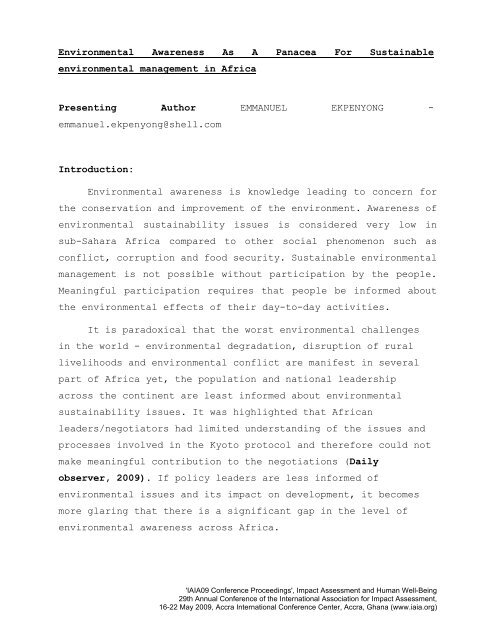
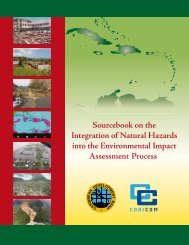
![Session Report [PDF] - International Association for Impact Assessment](https://img.yumpu.com/22416146/1/190x245/session-report-pdf-international-association-for-impact-assessment.jpg?quality=85)
![Session Report [PDF] - International Association for Impact Assessment](https://img.yumpu.com/22416140/1/184x260/session-report-pdf-international-association-for-impact-assessment.jpg?quality=85)
